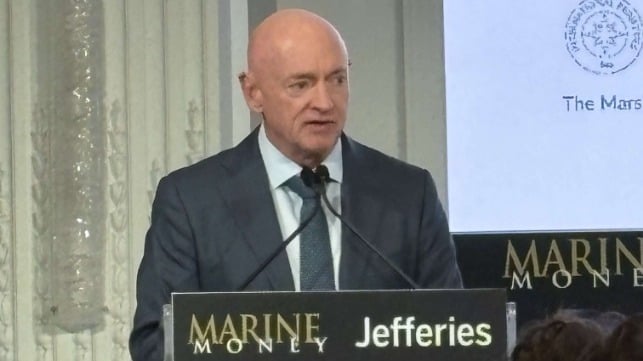Rebuilding U.S. Merchant Marine Will Be a “Heavy Lift”

Speaking at the opening of the 37th Annual Marine Money Week forum in New York, Senator Mark Kelly told the audience now is the time to reclaim America’s maritime heritage. The sponsor of the proposed SHIPS Act admitted that it would be a difficult but critical task, a view that is shared by many of the maritime industry leaders speaking at the conference.
Kelly points to the growing Chinese dominance of the shipping industry as measured by the number of ships operating under the Chinese flag and the country’s dominance of shipbuilding. While saying the United States does not desire a confrontation with China, he said the merchant marine plays a critical role both for trade and for national security. Kelly told the audience there is a critical need to rethink the U.S. maritime strategy.
The first graduate of the U.S. Merchant Marine Academy elected a senator in 2020, Mark Kelly of Arizona told the audience he has spent more time than anyone in the U.S. Congress thinking about the challenges of the U.S. merchant marine and shipbuilding sector. In December 2024, Kelly introduced the SHIPS for America Act (Shipbuilding and Harbor Infrastructure for Prosperity and Security) bill which has gained broad bipartisan support.
The bill was reintroduced in April 2025 with Kelly highlighting it provides a critical framework for reinvigorating U.S. flagged ship operations and shipbuilding. He points to the establishment of national oversight with a presidential-appointed board to formulate the maritime strategy. The bill provides a broad range of financial incentives and tax credits, the formation of a 250-ship strategic commercial fleet, efforts to support the U.S. shipbuilding and ship repair industry, and workforce recruiting and training. Kelly said the bill would provide the certainty needed for investment in shipping and shipbuilding.
Kelly calls the legislative initiative the most comprehensive effort for the maritime industry taken up by the U.S. Congress in a generation. Others attending also expressed excitement and the widely shared view that now is the time as the conversation about shipping has been elevated and has wide support. The view is that this is the best opportunity and if the industry and Congress fail to seize the initiative, the momentum will wane with time.
However, many question whether the U.S. has the will to follow through and make the investments required. All agree it is a long-term initiative and will require strong investment and guidance from the federal government to actualize the concepts and manage the implementation of the sometimes competing elements of the plan. Well-known industry commentator Sal Mercogliano provided a historical perspective while reminding the audience that the U.S.’s two largest shipbuilding programs each came during the world wars.
The industry is closely following the progress as the SHIPS Act moves toward committee and floor debate. It was also noted that President Donald Trump issued an Executive Order in April incorporating many elements of the SHIPS Act and setting the groundwork with industry studies.
Later in the conference executives from Hanwha Shipping and Hanwha Philly Shipyard highlighted the massive financial cost of the plan and the need for ships as well as how shipbuilding can be leveraged to meet the goals for rebuilding the American merchant marine. Hanwha said studies have already started looking at the steps required to reflag LNG carriers built in its Korean shipyard to the U.S. flag. Other panelists included shipowners and stakeholders in the Jones Act (U.S. cabotage regulations in the 1920 Merchant Marine Act).
“We don’t need more studies, we need a plan and action,” William Woodhour, president & CEO of Maersk Line, Limited, told the audience discussing the way forward to actionize the initiatives. It was a view shared by others including Benjamin Bordelon, President & CEO of Bollinger Shipyard. He told the audience the shipbuilding industry needs visibility and a long-term approach. One of the criticisms of the SHIPS Act is a focus on individual shipbuilding and ships where the industry says the groundwork must be provided for series of ships and long-term, repetitive building contracts. It must also bride administrations and not be dependent on annual budget authorizations.
Among the issues that will need to be addressed and guided are the balance between shipbuilding for the navy and the commercial industry, building cargo demand to spur the investment in ships, timing the shipbuilding to have the right ships in the right order to build the momentum, and most of all the recruitment and training of seafarers. Several people pointed out it takes 10 years or more for mariners to advance to the role of a ship’s master.

that matters most
Get the latest maritime news delivered to your inbox daily.
Shipowners represented by Dan Thorogood, President & CEO of Fairwater, and Samuel Norton, President & CEO of Overseas Shipholding Group, told the audience that the building blocks exist pointing to the vital role the Jones Act plays. They view the Jones Act as the springboard to the new efforts with the question being how to leverage what exists to meet the goals of expanding the U.S. merchant marine.
The consensus was that it is a good thing that the discussion about shipping has been elevated and that the U.S. is looking at actions to reinvigorate the merchant marine. As they expect the U.S. will move forward, they also expect it will encourage other nations to look at their shipping and follow the U.S.’s lead in rebuilding other national merchant marines.
The opinions expressed herein are the author's and not necessarily those of The Maritime Executive.
